CRM vs ERP: Which System Does Your Business Need?
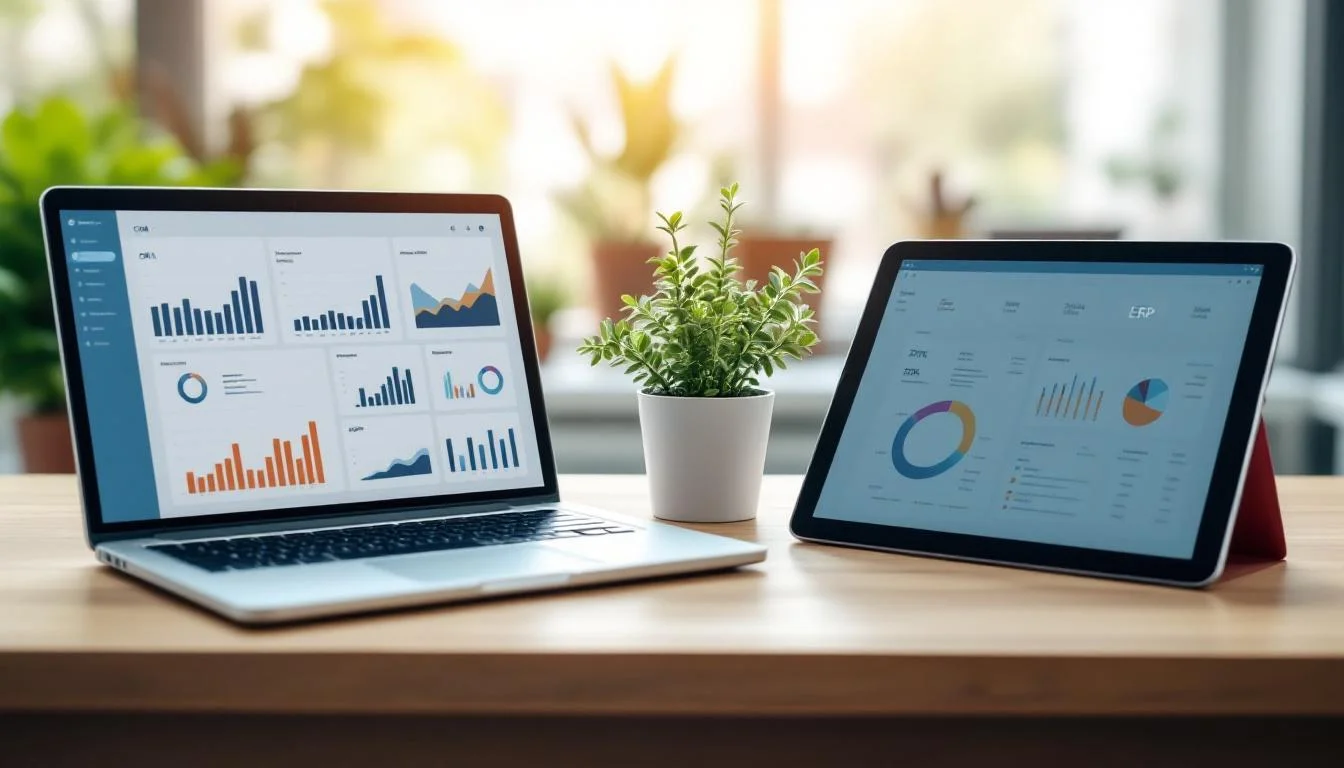
At Drop Cowboy, we often field questions about CRM versus ERP systems from businesses looking to streamline their operations. These powerful tools can significantly impact your company’s efficiency and growth.
But which one is right for your business? Let’s explore the key differences and similarities between CRM and ERP systems to help you make an informed decision.
What Is a CRM System?
The Essence of Customer Relationship Management
Customer Relationship Management (CRM) systems are powerful tools that help businesses manage and analyze customer interactions throughout the customer lifecycle. These systems serve as a central hub for customer data, interactions, and communication history. They allow businesses to track leads, manage sales pipelines, and nurture customer relationships. The primary goal of a CRM is to improve business relationships, which leads to customer retention and sales growth.
Key Features of CRM Software
Modern CRM systems come packed with features designed to streamline customer-facing processes. These typically include:
- Contact Management: Stores detailed customer information and interaction history.
- Sales Automation: Tracks sales opportunities and automates follow-ups.
- Marketing Automation: Manages and analyzes marketing campaigns.
- Customer Service Tools: Helps resolve customer issues efficiently.
- Analytics and Reporting: Provides insights into customer behavior and business performance.
Benefits of Implementing a CRM System
Implementing a CRM system can yield significant benefits for businesses of all sizes. According to a study by Nucleus Research, CRM systems deliver an average ROI of $8.71 for every dollar spent. Here are some key advantages:
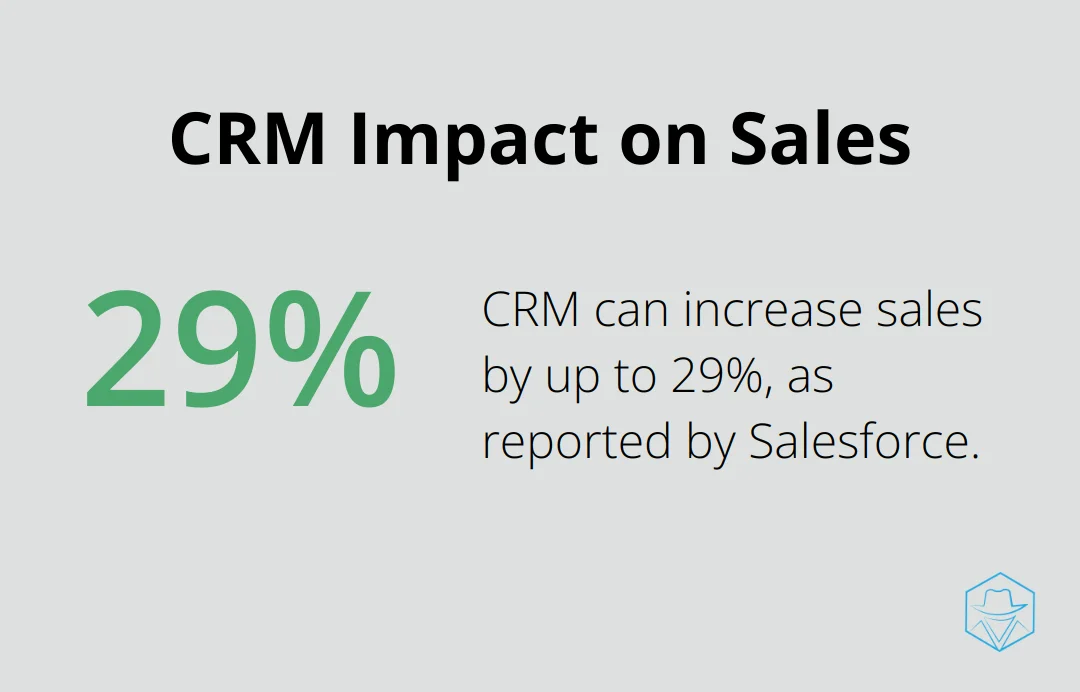
- Improved Customer Retention: A CRM helps businesses understand customer needs better, which leads to improved satisfaction and loyalty.
- Increased Sales: CRM systems provide a clear view of the sales pipeline, which can help increase close rates. Salesforce reports that CRM can increase sales by up to 29%.
- Enhanced Productivity: Automation of routine tasks saves time and reduces errors. A study by Capterra found that 47% of CRM users said their CRM had a significant impact on customer retention.
- Data-Driven Decision Making: With comprehensive analytics, businesses can make informed decisions based on real customer data.
- Better Team Collaboration: CRM systems facilitate information sharing across departments, which leads to more cohesive customer experiences.
Choosing the Right CRM System
While CRM systems offer numerous benefits, it’s important to choose the right one for your business needs. Some platforms (like Drop Cowboy) integrate CRM-like features into their communication tools, allowing businesses to manage customer communications effectively alongside other capabilities such as ringless voicemail and SMS. This integration can provide a more holistic approach to customer relationship management, especially for businesses focusing on direct communication strategies.
As we move forward, let’s explore another powerful business management tool: ERP systems. These systems offer a different set of features and benefits that complement CRM in many ways.
What Is an ERP System?
The Essence of Enterprise Resource Planning
Enterprise Resource Planning (ERP) systems are comprehensive business management tools that integrate various functions across an organization. These systems streamline operations, improve efficiency, and provide a unified view of business processes.
Core Components of ERP
ERP systems typically encompass several key business functions:
- Financial Management: This includes accounting, budgeting, and financial reporting. A report by Panorama Consulting indicates that 95% of businesses saw an improvement in their financial processes after implementing an ERP system.
- Human Resources: ERP systems often include modules for payroll, employee management, and talent acquisition. Nucleus Research found that ERP systems can reduce HR administrative costs by up to 22%.
- Supply Chain Management: This covers inventory management, procurement, and logistics. The Aberdeen Group reports that companies with ERP systems can reduce operational costs by 23% and administrative costs by 22%.
- Manufacturing: For production-based businesses, ERP systems manage production planning, scheduling, and quality control. Manufacturers using ERP systems have reported a 13% improvement in manufacturing operational costs (according to Panorama Consulting).
Key Features of ERP Software
Modern ERP systems offer a range of features designed to enhance business operations:
- Real-time Data Access: ERP systems provide up-to-date information across all departments, enabling faster decision-making.
- Automation: Many routine tasks can be automated, which reduces errors and frees up staff time for more strategic activities.
- Reporting and Analytics: Advanced reporting tools help businesses gain insights from their data. Gartner reports that organizations using ERP analytics can improve their decision-making process by 25%.
- Customization: Many ERP systems allow for customization to fit specific business needs (however, excessive customization can lead to higher costs and complexity).
- Mobile Access: Modern ERP systems often offer mobile apps, allowing employees to access information and perform tasks on the go.
Advantages of Using an ERP System
Implementing an ERP system can yield significant benefits:
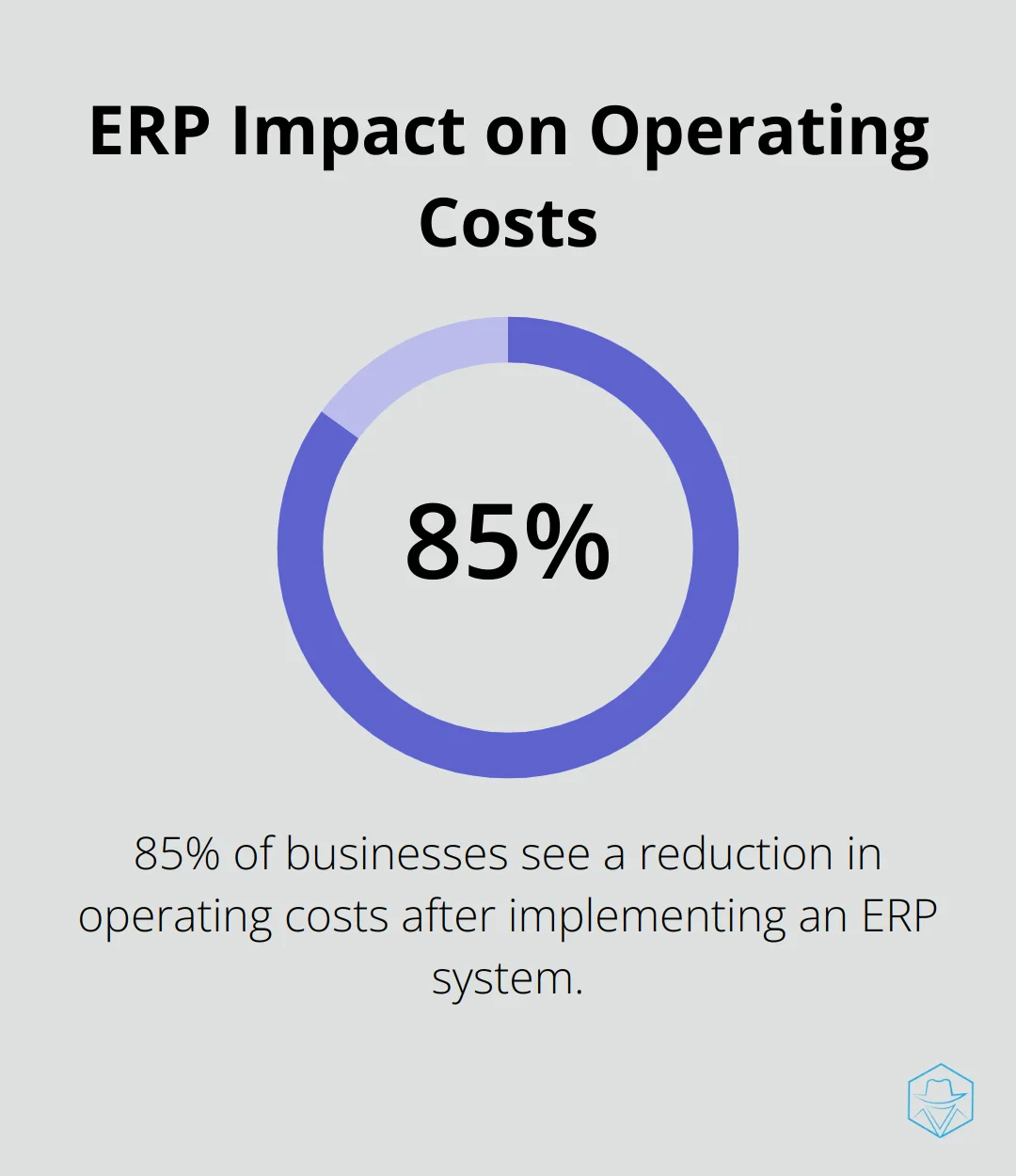
- Improved Efficiency: The integration of various business processes eliminates redundancies and streamlines operations. Nucleus Research found that ERP systems can increase business productivity by 22%.
- Better Decision Making: Access to real-time data across the organization allows management to make more informed decisions. Aberdeen Group reports that companies with ERP systems are 35% more likely to make decisions before a deadline.
- Cost Savings: While the initial investment can be significant, ERP systems often lead to long-term cost savings. Panorama Consulting reports that 85% of businesses see a reduction in operating costs after implementing an ERP system.
- Enhanced Customer Service: A unified view of customer interactions and business processes enables companies to provide better, more consistent customer service.
- Scalability: As a business grows, an ERP system can scale to accommodate increased volume and new processes.
ERP systems offer numerous benefits, but businesses must carefully consider their needs and resources before implementation. In the next section, we’ll compare CRM and ERP systems to help you determine which might be the best fit for your business needs.
CRM vs ERP: Which System Fits Your Business?
Primary Focus and Objectives
CRM systems focus on managing customer relationships, sales processes, and marketing efforts. Their main objective is to improve customer satisfaction, increase sales, and streamline customer-facing operations. ERP systems take a broader approach, integrating various internal business processes such as finance, HR, manufacturing, and supply chain management. The goal of an ERP system is to enhance overall operational efficiency and provide a unified view of the entire business.
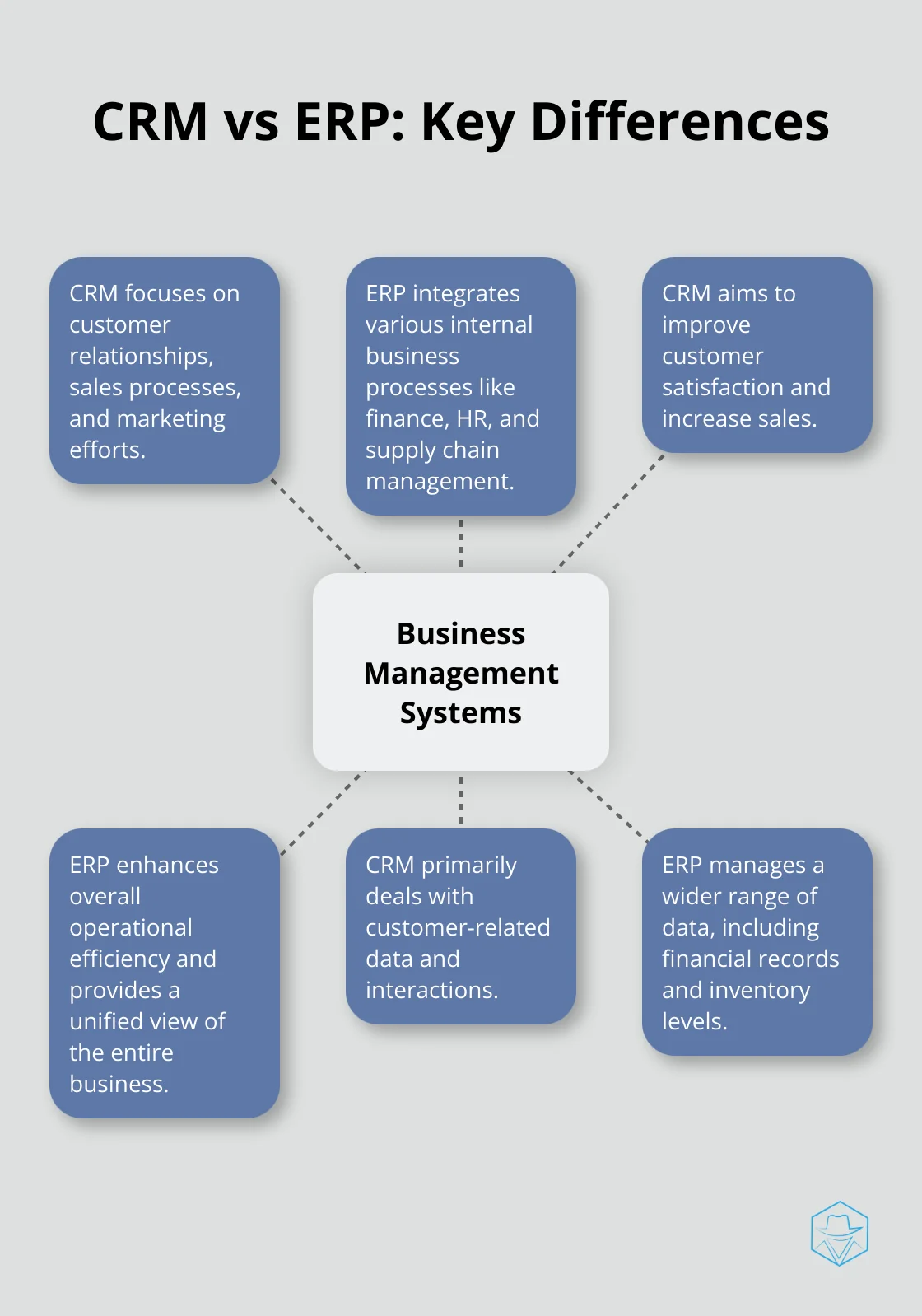
Data Management and Integration
CRM and ERP systems excel at data management, but they handle different types of data. CRM systems primarily deal with customer-related data, including contact information, interaction history, and sales opportunities. ERP systems manage a wider range of data, including financial records, inventory levels, and employee information.
Integration capabilities differ as well. CRM systems often integrate with marketing tools and customer service platforms, while ERP systems typically offer more extensive integration across various business functions. A study by Panorama Consulting found that 67% of businesses cite improved business integration as a key reason for implementing an ERP system.
Customization and Scalability
Both CRM and ERP systems offer customization options, but the extent and complexity can vary. CRM systems are often more flexible and easier to customize, allowing businesses to tailor the system to their specific sales and marketing processes. ERP systems, while customizable, often require more extensive configuration due to their broader scope.
In terms of scalability, both systems can grow with your business, but in different ways. CRM systems can easily accommodate more users and customers as your business expands. ERP systems can scale to handle increased transaction volumes and additional business processes as your company grows.
Cost Considerations and ROI
The cost of implementing a CRM system is typically lower than that of an ERP system. According to Capterra, the average cost per user for a CRM system is around $70 per month. ERP systems, due to their complexity and broader scope, can cost significantly more. Panorama Consulting reports that the average ERP implementation costs about 5.5% of a company’s annual revenue.
However, both systems can offer substantial ROI when implemented effectively. Nucleus Research found that CRM systems deliver an average of $8.71 for every dollar spent. For ERP systems, Panorama Consulting reports that 95% of businesses improve some or all of their processes after implementation.
Choosing the Right System
The choice between CRM and ERP depends on your business needs, size, and growth plans. CRM systems excel at managing customer relationships and sales processes, while ERP systems offer a more comprehensive approach to managing overall business operations. Some businesses may benefit from implementing both systems to cover all aspects of their operations.
It’s worth noting that some platforms offer CRM-like features integrated into their communication tools (such as Drop Cowboy). This can provide a cost-effective solution for businesses primarily focused on customer communication and engagement, without the need for a full-scale CRM or ERP system.
Final Thoughts
CRM and ERP systems offer distinct benefits for businesses aiming to optimize their operations. CRM systems focus on managing customer relationships and enhancing sales processes, while ERP systems integrate various business functions for comprehensive management. The choice between CRM versus ERP depends on your business’s primary needs and growth trajectory.
Many businesses implement both CRM and ERP systems to create a powerful synergy that addresses customer-facing and internal operations. This integrated approach provides a complete view of your business, enabling data-driven decisions and fostering growth. For businesses primarily focused on customer communication, platforms like Drop Cowboy offer an innovative solution.
Drop Cowboy integrates CRM-like features with advanced communication tools such as ringless voicemail and SMS. This provides a cost-effective way to manage customer interactions without the need for a full-scale CRM or ERP system. Your unique business needs, budget, and long-term goals will guide your decision in selecting the right system for your company.
blog-dropcowboy-com
Related posts

August 5, 2025
How to Use Infobip Voice API for Your Business
Boost your business by implementing Infobip Voice API to enhance communication, streamline operations, and improve customer engagement.
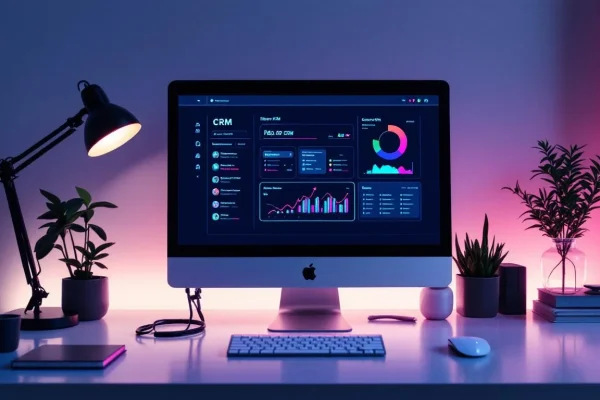
June 4, 2025
Neon CRM Pricing: Is It Worth the Investment?
Explore Neon CRM pricing and find out if it’s worth the investment for your organization with an in-depth analysis of costs and benefits.

May 6, 2025
Top CRMs for Effective Marketing Automation
Explore the best CRM marketing automation tools to streamline your marketing efforts. Discover top solutions for maximizing efficiency and driving growth.

July 20, 2025
Marketing Automation Best Practice: Boost Engagement
Boost engagement with best practice marketing automation tips. Elevate your strategy using practical insights and proven techniques.

June 16, 2025
The Dual Channel Strategy: Benefits of SMS Marketing + Ringless Voicemail
Reaching people quickly matters more than ever. Attention spans are short, and timing is everything. According to the CTIA, Americans send and exchange 2 trillion text messages each year. This makes it one of the most effective engagement strategies. But what if you could combine the benefits of SMS marketing along with key ringless voicemail benefits into one dual-channel […]

August 28, 2025
Why Voice Synthesis is Revolutionizing Marketing Automation
Explore how voice synthesis marketing is transforming automation, boosting engagement, and elevating user experiences across industries.